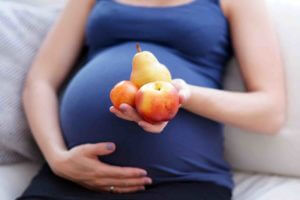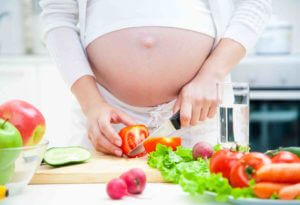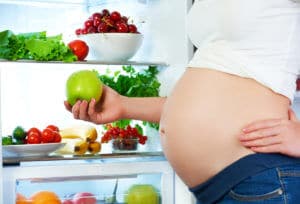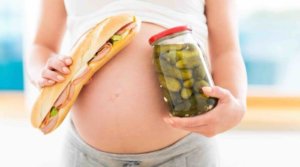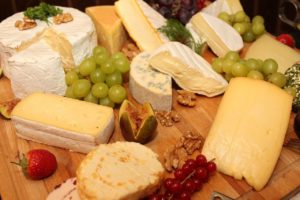What not to eat during pregnancy? A big and important question – and it is not easy to get an overview in the required rush.
In this article, you’ll find out if and when the popular mozzarella cheese used in many snacks is one of the “forbidden foods” during pregnancy.
And we explain the context: why can cheese, especially raw milk cheese, be dangerous in pregnancy?
Table of contents
Mozzarella In Pregnancy: Healthy And Valuable, But Not All Cheese Is Allowed
When you are pregnant, you have to take care of the unborn child with your own food.
Of course, this child should be supplied as completely as possible, which is not so easy: 36 different nutritional components, vitamins, minerals and trace elements have so far been safely identified by science as essential.
This means that they cannot be produced by the body itself and must be supplied vitally with food.
The more colorful, wholesome and natural your diet is, the better the chance that you will always have filled up your stores to provide your baby with the best possible care.
A wide variety of cheeses should be on the menu more often, as they are packed with nutrients: Lots of protein with healthy amino acids, minerals, and trace elements such as calcium, potassium, magnesium, iron, copper, phosphorus, and zinc.
Furthermore, vitamins A, B2, B12, D, K and at least a few of the so important omega-3 fatty acids, which can be supplied in sufficient quantities almost only through fish.
You need a little more of everything as a pregnant woman. Eating cheese regularly will especially help you get enough protein and vitamin B12.
The nutrients in the cheeses have a positive effect on the baby’s brain development and bone formation, support your metabolism and your heart.
Caution – exception: raw milk cheese is not one of the cheeses recommended for consumption during pregnancy. Below you will learn why this is so and how to recognize a cheese made from raw milk.
Raw Milk Cheese: Listeria Can Endanger Your Baby
People are constantly surrounded by germs in their lives. Living with these germs is quite normal, they even live to a large extent in our bodies and on our skin.
Normally, the more germs a human body knows, the better its (therefore well-trained) immune system can deal with all kinds of stress.
When you are pregnant, this is actually true in the same way, you even train the baby’s immune system at the same time. However, science has now observed that some germs and bacteria are particularly cheeky and like to exploit weaknesses in humans.
For these microorganisms, your pregnancy is a weakness – simply because your body is performing the incredible and demanding task of creating a new human being and cannot take care of “all the immune stuff” with the usual precision.
Listeria is one of these few, particularly cheeky germs. Listeria is everywhere, all over the world, the every day “dirt” germs belong to the microorganisms that turn all kinds of residues into the soil by rotting in the soil.
That is why they are also found in natural waters and almost all food and feed that comes out of the ground or comes into contact with dust.
Spoiled hay or silage contaminated with soil is loved by listeria, on unwashed fruits and vegetables except for carrots, apples and tomatoes they can also last for a while.
But in the barns where gammy hay etc. is fed, they can also fly into the fresh milk and survive well and for a long time on the raw milk cheese.
Mozzarella in pregnancy can therefore become a problem if it is made from raw milk – pregnant women should stay away from these microorganisms. Listeria can cross the placental barrier.
The unborn child has not yet developed its own defense mechanisms against this germ and is at the mercy of the listeria without protection. In the worst case, this can trigger a listeriosis infection and subsequently a miscarriage, lead to neonatal sepsis or cause meningitis or pneumonia in the baby.
There is no reason to panic, it happens only very rarely even under the most unfavorable conditions. But today we know what it is and we can warn you, especially because the potential danger can be eliminated by very simple measures.
Beware of trips to the countryside: these simple measures do not only include avoiding mozzarella during pregnancy.
Now that you know where listeria likes to cavort in quantities, you also immediately understand why you should also avoid the following activities: The extended barn visit during a trip to the countryside, cuddling with pigs, sheep, goats in the petting zoo, poking around in unknown piles of soil and compost.
This is especially true if you live in the city and don’t spend much time in gardens, so your immune system hasn’t had much to do with listeria.
What Is Raw Milk Cheese And How Do You Recognize Potentially Dangerous Cheeses?
Raw milk cheese is made from fresh, raw milk. It reaches a maximum temperature of 40°C throughout the processing process to raw milk cheese, which is intentional so that the cheese cultures, which also consist of bacteria, can work optimally.
Normally, these cheese cultures also gain the upper hand, but listeria contained in the milk also survive and, under certain conditions, can even gain the upper hand and continue to multiply.
Because this is the case and because pregnant women and people who are immunocompromised due to illness or medication should refrain from eating raw milk cheese as a precaution, raw milk cheese is subject to strict labeling requirements in our country.
The Foodstuffs Ordinance prescribes clear labeling for raw milk cheese: A note such as “not pasteurized”, “made from unpasteurized milk”, “made from raw milk” or “made from raw milk”.
Especially with the following types of cheese, you should keep your distance right from the start, except for raw milk mozzarella during pregnancy:
Potentially Dangerous Types Of Cheese From Raw Milk Cheese
There are several types of cheese that are traditionally made as raw milk cheeses:
- Among soft and semi-soft cheeses, these include Brie and Camembert (for which see alsowww.zeit.de/zeit-magazin/essen-trinken/2018-05/camembert-normandie-herstellung-pasteurisierter-milch-eu-recht).
- White mold cheese and blue mold cheese are available in many cheese varieties as raw milk cheese, e.g. Roquefort and Gorgonzola, Bergader cheese, and the English Stilton.
- Among the sour milk cheeses, Handkäse, Korbkäse, Spitzkäse, Harzer Roller and Mainzerkäse belong to the raw milk cheese varieties.
- Soft cheeses with red smear rind are sold as raw milk cheeses under the names Limburger, Münster, and Romadur.
Tip
If you are offered a cheese in a situation where labeling is not available, you should rely on your nose when in doubt.
Raw milk cheese is the cheese that has the most aroma and a very distinct flavor. Our taste receptors on the tongue can only detect the main flavors sweet, sour, bitter, salty.
All other flavors are perceived through the sense of smell – and this smell is very distinct in most types of raw milk cheeses.
Mozzarella In Pregnancy: Risk Or Allowed?
Mozzarella is often referred to as Italian fresh cheese; it even carries the freshness in its name: The Italian word “mozzarella” is a trivialized form of the Italian word “mozza” = fresh cheese.
Sounds a lot like it’s made from fresh raw milk? Not quite: Italian farmers certainly didn’t think about the distinction based on bacterial susceptibility when they gave the name.
When the first mozzarella was formed hundreds of years ago, the barns were still natural, clean, and airy. Nor would anyone have known which bacteria survived better or worse at which temperatures.
If we take a closer look at the production process, mozzarella turns out to be a close relative of the so-called scalded cheeses.
In the traditional production of mozzarella from cow’s milk, the curd is scalded with water at 80 °C after being lifted out of the whey, and only then formed into balls.
What is sold in our country as mozzarella from cow’s milk must have been produced in the same way according to § 7 of the Cheese Ordinance. When the mozzarella is sold in our country, it is also tested for microbiological safety according to the regulations of the Codex Alimentarius.
Industrially produced, packaged cow’s milk mozzarella can therefore be enjoyed by expectant moms without a guilty conscience.
This cow mozzarella is the usual and most common mozzarella in our country, which also usually ends up on the pizza in the restaurant; is used in the bakery, in the snack bar, the snack bar.
But from this rule to mozzarella in pregnancy there are exceptions:
Mozzarella In Pregnancy: In These Cases, Germ Contamination Is Possible
The situation is different with mozzarella made from buffalo milk, which can become a risk during pregnancy: Buffalo mozzarella is exposed to maximum temperatures of 33 – 36 °C during traditional processing and is also sold in exactly the same way in our country.
At these temperatures, not only listeria, with which the milk may have been contaminated, but also much worse pathogens survive.
You can recognize buffalo mozzarella by names like “Mozzarella di Bufala Campana”, “Mozzarella bufala” and in a larger form also “Mozzarellone Aversane”.
Mozzarella Burrata, the mozzarella variety in the form of a small bag with a creamy filling, is usually made from cow’s milk. But there is also mozzarella burrata made from buffalo milk, so here carefully read the sales description.
Often cow mozzarella is generally declared harmless because it is made from pasteurized milk. It is not quite like that: first of all, mozzarella made from raw milk is occasionally used in restaurants, so always ask the waiter as a precaution.
If the mozzarella is lying with feta, sheep’s cheese, or cream cheese in open containers or openly in a display in a restaurant, pregnant women should also rather do without. This is because even when pasteurized, some listeria can survive and then happily multiply in the display.
Of course, this also applies to mozzarella in bakeries and snack bars and to mozzarella at home, and it generally applies to any type of cheese, even pasteurized ones.
Tip
Other germ loads can hide here: Listeria may have survived in the rind of raw milk cheeses and also cheeses made from pasteurized milk.
In the case of cheese sold ready grated, the grated Parmesan in the table carousel at the Italian restaurant and the sandwich with mozzarella topping in the display of the snack store, which is already slightly dried, the utmost caution is also required with regard to germ contamination.
Safe Cheeses
There are many types of cheese made from pasteurized milk that pregnant women can safely consume, with the exception of the cheese rind just mentioned. Here is an overview of the main types of cheese that are safe for pregnant women:
- Mountain cheese.
- Butter cheese.
- Cheddar.
- Edam.
- Emmental (raw milk cheese, on which listeria does not survive due to long ripening and high salt content).
- Feta, cream cheese, mascarpone, ricotta, packaged and industrially produced sheep’s milk cheese.
- Fondue cheese, raclette cheese, oven cheese.
- Gouda.
- Cooked and processed cheese.
- Leerdammer.
- Parmesan (raw milk cheese, on which listeria does not survive due to long ripening and high salt content).
- Tilsiter.
Summary: Mozzarella During Pregnancy – Only Allowed With Important Restrictions
Mozzarella from industrial production is made in this country from pasteurized milk and is also made from milk heated to 80 °C when imported from abroad. It can be consumed by pregnant women without hesitation if the package has been freshly opened.
However, it should not be stored for a long time, because the moist cheese likes to trap all the germs from the environment.
Domestic buffalo mozzarella is usually made from pasteurized buffalo milk, but the original from Italy is made from raw milk and should be avoided during pregnancy due to the risk of listeriosis.
Special care should also be taken with mozzarella that has been on a buffet or fresh counter for some time, ready-grated mozzarella, prepared sandwiches and rolls with mozzarella.
When a dish is topped with mozzarella or baked, listeria is killed, so it no longer poses a risk.
However, the questions of“what not to eat during pregnancy” and how much of a particular food like mozzarella is advisable during pregnancy are ultimately always very theoretical questions.
The body usually says very clearly during pregnancy what it would like to have, this phenomenon is also known as ravenous hunger during pregnancy.
Sources
https://praxistipps.focus.de/mozzarella-in-der-schwangerschaft-das-sollten-sie-beachten_105114





